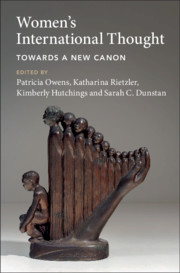Book contents
- Women’s International Thought: Towards a New Canon
- Women’s International Thought: Towards a New Canon
- Copyright page
- Contents
- Preface and Acknowledgments
- Introduction
- 1 Field and Discipline
- 2 Geopolitics and War
- 3 Imperialism
- 4 Anticolonialism
- 5 International Law and International Organization
- 6 Diplomacy and Foreign Policy
- 7 World Peace
- 8 World Economy
- 9 Men, Women, and Gender
- 10 Public Opinion and Education
- 11 Population, Nation, Immigration
- 12 Technology, Progress, and Environment
- 13 Religion and Ethics
- From Introduction to Democracy and Social Ethics (1902)
- From “Anarchism: What It Really Stands for” (1911)
- From “Equality of Races and the Democratic Movement” (1925)
- From Is There a Case for Foreign Missions? (1933)
- From “Hoodoo” (1935)
- From “Voodoo” (1938)
- From Letter to a Priest (1951)
- From Faith and Freedom: A Study of Western Society (1954)
- From Mr Truman’s Degree (1956)
- Jane Addams
- Emma Goldman
- Anna Julia Cooper
- Pearl S. Buck
- Zora Neale Hurston
- Simone Weil
- Barbara Ward
- G. Elizabeth Anscombe
- Index
Emma Goldman
from 13 - Religion and Ethics
Published online by Cambridge University Press: 12 April 2022
- Women’s International Thought: Towards a New Canon
- Women’s International Thought: Towards a New Canon
- Copyright page
- Contents
- Preface and Acknowledgments
- Introduction
- 1 Field and Discipline
- 2 Geopolitics and War
- 3 Imperialism
- 4 Anticolonialism
- 5 International Law and International Organization
- 6 Diplomacy and Foreign Policy
- 7 World Peace
- 8 World Economy
- 9 Men, Women, and Gender
- 10 Public Opinion and Education
- 11 Population, Nation, Immigration
- 12 Technology, Progress, and Environment
- 13 Religion and Ethics
- From Introduction to Democracy and Social Ethics (1902)
- From “Anarchism: What It Really Stands for” (1911)
- From “Equality of Races and the Democratic Movement” (1925)
- From Is There a Case for Foreign Missions? (1933)
- From “Hoodoo” (1935)
- From “Voodoo” (1938)
- From Letter to a Priest (1951)
- From Faith and Freedom: A Study of Western Society (1954)
- From Mr Truman’s Degree (1956)
- Jane Addams
- Emma Goldman
- Anna Julia Cooper
- Pearl S. Buck
- Zora Neale Hurston
- Simone Weil
- Barbara Ward
- G. Elizabeth Anscombe
- Index
Summary
“Property is robbery,” said the great French Anarchist Proudhon. Yes, but without risk and danger to the robber. Monopolizing the accumulated efforts of man, property has robbed him of his birthright, and has turned him loose a pauper and an outcast. Property has not even the time-worn excuse that man does not create enough to satisfy all needs. The A B C student of economics knows that the productivity of labor within the last few decades far exceeds normal demand. But what are normal demands to an abnormal institution? The only demand that property recognizes is its own gluttonous appetite for greater wealth, because wealth means power; the power to subdue, to crush, to exploit, the power to enslave, to outrage, to degrade. America is particularly boastful of her great power, her enormous national wealth. Poor America, of what avail is all her wealth, if the individuals comprising the nation are wretchedly poor? If they live in squalor, in filth, in crime, with hope and joy gone, a homeless, soilless army of human prey.
- Type
- Chapter
- Information
- Women's International Thought: Towards a New Canon , pp. 708 - 712Publisher: Cambridge University PressPrint publication year: 2022



